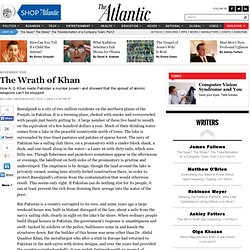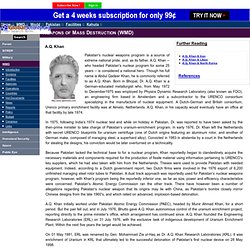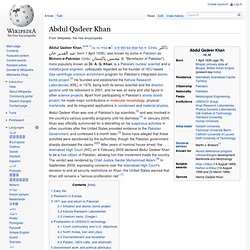

The Wrath of Khan - William Langewiesche. How A.

Q. Khan made Pakistan a nuclear power—and showed that the spread of atomic weapons can't be stopped Rawalpindi is a city of two million residents on the northern plains of the Punjab, in Pakistan. It is a teeming place, choked with smoke and overcrowded with people just barely getting by. A large number of them live hand to mouth on the equivalent of a few hundred dollars a year.
But Pakistan is a country corrupted to its core, and some years ago a large weekend house was built in blatant disregard of the law, about a mile from the navy's sailing club, clearly in sight on the lake's far shore. In any case, by the time he built the house on the lake, he believed wholeheartedly in his own greatness. Then for Khan, in January of 2004, the good life came crashing down. Khan's top lieutenants had already been detained. Khan therefore remains an enigma—a man who may die in isolation, still carrying his secrets with him. He also said that Musharraf is rooting out corruption. A.Q. Khan. Pakistan's nuclear weapons program is a source of extreme national pride, and, as its father, A.Q.

Khan -- who headed Pakistan's nuclear program for some 25 years -- is considered a national hero. Though his full name is Abdul Qadeer Khan, he is commonly referred to as A.Q. Khan. Born in Bhopal, Dr. A.Q. In 1975, following India's 1974 nuclear test and while on holiday in Pakistan, Dr. was reported to have been asked by the then-prime minister to take charge of Pakistan's uranium-enrichment program. Because Pakistan lacked the technical base to for a nuclear program, Khan reportedly began to clandestinely acquire the necessary materials and components required for the production of fissile material using information pertaining to URENCO's key suppliers, which he had also taken with him from the Netherlands.
A.Q. On 01 May 1981, ERL was renamed by Gen. Abdul Qadeer Khan. Abdul Qadeer Khan,[note 1] NI, HI, FPAS Abdul Qadeer Khan was one of Pakistan's top scientists,[3] and was involved in the country's various scientific programs until his dismissal.[3] In January 2004, Khan was officially summoned for a debriefing on his suspicious activities in other countries after the United States provided evidence to the Pakistan Government, and confessed it a month later.[3] Some have alleged that these activities were sanctioned by the authorities, though the Pakistan government sharply dismissed the claims.[4][5] After years of nominal house arrest, the Islamabad High Court (IHC) on 6 February 2009 declared Abdul Qadeer Khan to be a free citizen of Pakistan, allowing him free movement inside the country.

Early life[edit] Research in Europe[edit] In 1972, the year he received his doctorate, Abdul Qadeer Khan through a former university classmate, and a recommendation from his old professor and mentor, Martin J. 1971 war and return to Pakistan[edit]